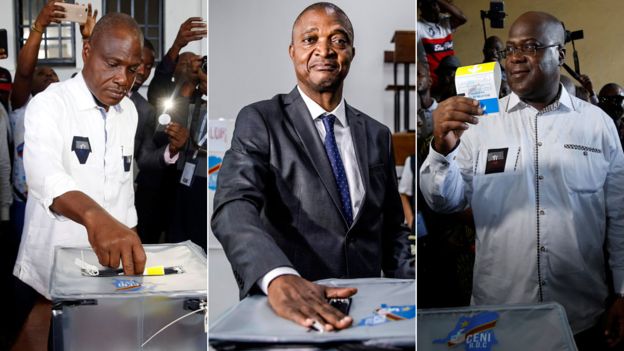Vote counting is continuing in the Democratic Republic of Congo after Sunday’s crucial general elections.
The voting process on Sunday was characterized by delays and long queues, leaving many voters frustrated.
About 40 million voters participated in choosing a new President and lawmakers across the country.
But three volatile regions were excluded from Sunday’s votes. Elections will be held in those areas in March 2019.
These regions are Yumbi, Beni and Butembo. Beni and Butembo in the east continue to battle with the Ebola outbreak.
Yumbi in the west has also witnessed ethnic violence in the past days with more than 100 people reportedly killed.
In #Beni people have organized to vote despite the @cenirdc decision to delay the vote until March. Four sites have opened in Kalinda, Kaliva, Bungulu and Mabolyo with help from local Ceni agents. What an incredible & courageous demonstration of people’s will #DRCelections pic.twitter.com/yQNYWVVKoE
— Mélanie Gouby (@Melaniegouby) December 30, 2018
Opposition cries foul
The opposition in the central African country is however raising concerns about what it calls widespread irregularities during the vote.
An opposition leader, Felix Tshisekedi was unhappy with the chaos that characterized the entire process.
He is quoted by Reuters as saying that “There is a big mess and we are asking ourselves if this is not an organised chaos to ensure that tomorrow the constitutional court cancels everything.”
Another opposition leader, Martin Fayulu also told a news conference that electoral lists were posted late. He said names were misprinted as well and machines did not work.
“All these irregularities will for sure have a negative impact on the process led today by the CENI,” he said.
Final results for Sunday’s presidential election will be announced on January 15 and the new president sworn in on January 18.
Both opposition and ruling coalition are claiming victory even before partial results are made public.
Key contenders
21 candidates contested the presidential elections but there are three key frontrunners.
The ruing coalition was represented by Emmanuel Ramazani Shadary who is a former interior minister. He was backed by outgoing President Joseph Kabila.
The major rival for Shadary is Martin Fayulu from an opposition coalition. Fayulu is a former oil executive and backed by several other opposition leaders hoping to defeat the ruling party.
The third contender is Felix Tshisekedi Tshilombo, the son of a late veteran opposition leader. He refused to back Fayulu after withdrawing from an agreement to back the opposition coalition candidate.

The elections took place without President Joseph Kabila. President Kabila took over as president from his father Laurent who was assassinated in 2001.
He has failed to hold elections during his tenure on several occasions, a decision that sparked violence for years.
Source: Africafeeds.com



